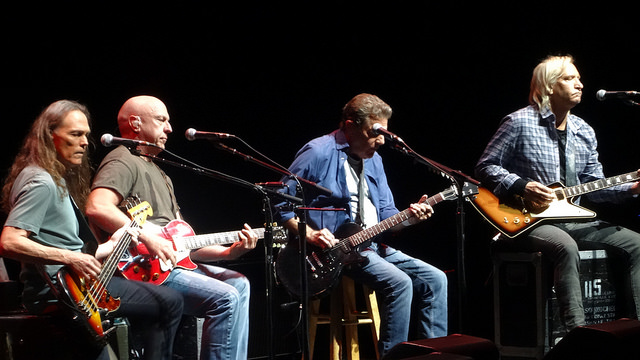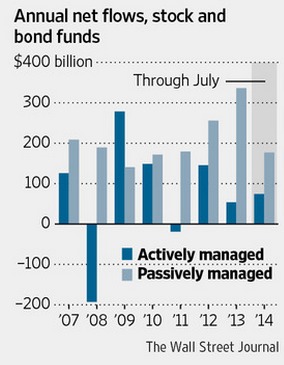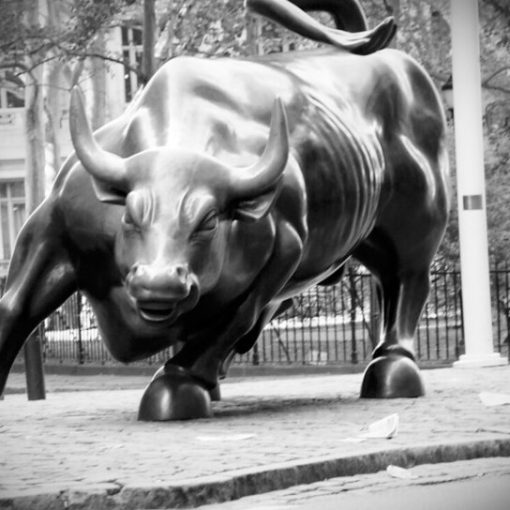Active and passive investors have been at each other’s throats for decades, but maybe it’s time to bury the hatchet.
After all, Don Henley famously said the Eagles would get back together “when hell freezes over,” yet the band members made up and are still rocking. Stevie Nicks said there was “more of a chance of an asteroid hitting the Earth” than Fleetwood Mac reuniting with Christine McVie in the lineup, but it’s happening.

So maybe there is a ray of hope that active and passive investors can finally set aside their differences and just get along.
Ballyhooed battle
We recently wrote about the ancient active vs. passive investing debate, and why it actually misses the point. As a reminder, passive investors love index funds and ETFs that are designed to mirror the market, while active managers try to beat the market.
“In one corner, we have stock pickers who scoff at index funds that just track the market. In the other corner, we have indexing fans who view most active managers as fools or swindlers,” says MarketWatch reporter Victor Reklaitis.
“But maybe the ballyhooed battle between active and passive investing has run its course,” he adds. “Aren’t we all active investors in some way? Perhaps it’s time to move beyond this debate.”
A flawed question
Interestingly, some die-hard indexing fans have also been saying the active vs. passive debate is getting a bit passé nowadays.
“I would say definitely that active vs. passive is kind of a flawed question because it’s really about cost,” says Samuel Lee, who covers ETFs at investment researcher Morningstar. “You don’t have to be dogmatic about just owning index funds, and this is coming from someone who loves index funds and has the majority of his assets in them.”
The financial crisis and mistrust of Wall Street both probably accelerated the trend to passive investing in recent years.
“Investors poured a net $336 billion into passively managed stock and bond funds in 2013, handily beating the $53 billion invested in traditional mutual funds of the same type,” The Wall Street Journal reports. “So far this year through July, investors put a net $177 billion into those passive funds, compared with $74 billion in actively managed funds.”
Perhaps the biggest beneficiary of the passive indexing craze is index fund giant Vanguard Group.
Joel Dickson, a senior investment strategist at Vanguard, recently weighed in on the active vs. passive debate at the Morningstar ETF Conference.
“This whole idea of passive and active I think is getting a little bit outmoded, and it’s really about the underlying investment strategy that you’re trying to achieve and invest in that ultimately is the determinant for how you should think about building your portfolio,” Dickson said.
In fact, a recent report highlighted the fact that Vanguard’s low-cost actively managed funds have quietly outperformed their more-famous index siblings.
Blurred lines
The reality is that a mix of active and passive strategies could be the best approach for some investors.
And some newer investing strategies such as “smart beta” and “enhanced indexing” have blurred the lines between active and passive investing.
Some active managers are adopting features of passive investing, such as low costs, low turnover and tax efficiency. Meanwhile, active traders are using passive investment vehicles such as index-based ETFs in their trading strategies.
“There are different degrees of passive and active and it doesn’t make sense to lump either term with any one type of fund or strategy,” writes Ben Carlson at A Wealth of Common Sense blog. “Indexed investing doesn’t necessarily mean no activity just like active investing doesn’t necessarily mean tons of activity. It all depends on how an investor chooses to utilize these strategies within a broad investment plan.”
So maybe it is time to put the active vs. passive brouhaha to rest. That way, we can focus on more important debates (like who is the greatest classic rock band of the 1970s).
Continue learning: Why the active vs. passive debate misses the point
—
Photo credit: Rachel Kramer via Flickr Creative Commons






